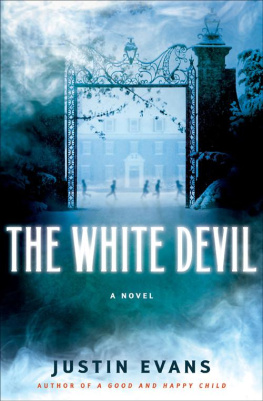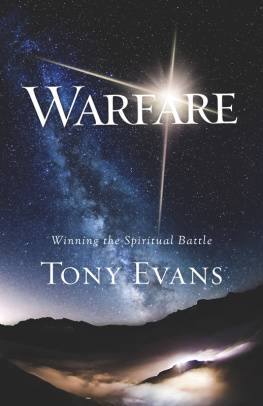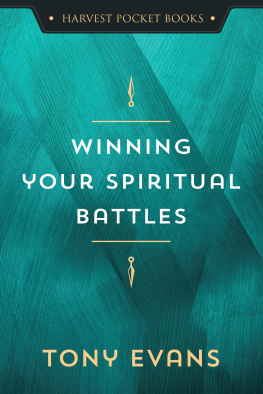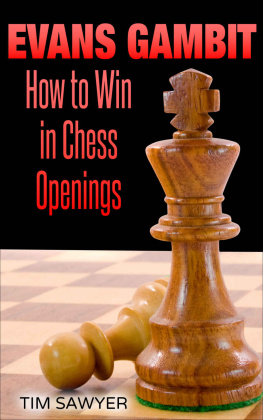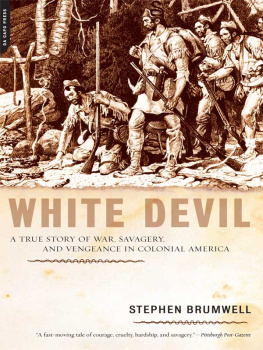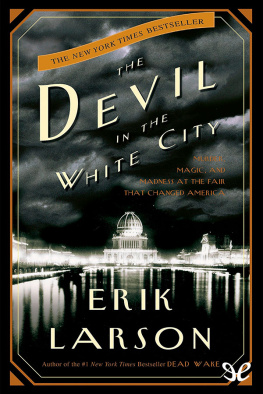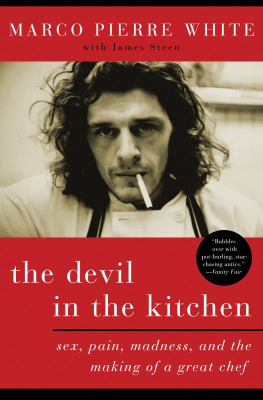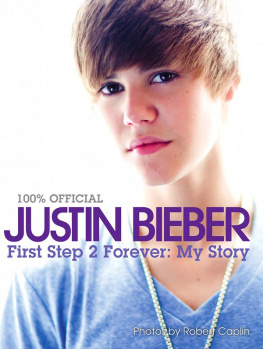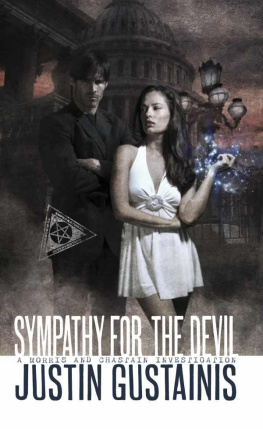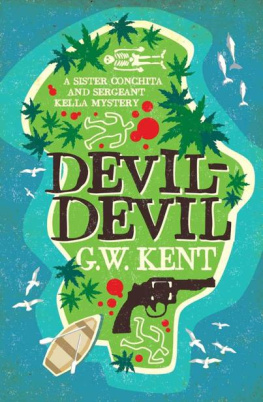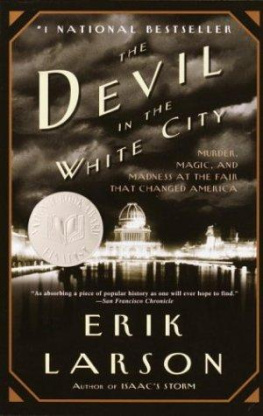Justin Evans - The White Devil
Here you can read online Justin Evans - The White Devil full text of the book (entire story) in english for free. Download pdf and epub, get meaning, cover and reviews about this ebook. year: 2011, publisher: HarperCollins Publishers, genre: Detective and thriller. Description of the work, (preface) as well as reviews are available. Best literature library LitArk.com created for fans of good reading and offers a wide selection of genres:
Romance novel
Science fiction
Adventure
Detective
Science
History
Home and family
Prose
Art
Politics
Computer
Non-fiction
Religion
Business
Children
Humor
Choose a favorite category and find really read worthwhile books. Enjoy immersion in the world of imagination, feel the emotions of the characters or learn something new for yourself, make an fascinating discovery.
- Book:The White Devil
- Author:
- Publisher:HarperCollins Publishers
- Genre:
- Year:2011
- Rating:4 / 5
- Favourites:Add to favourites
- Your mark:
- 80
- 1
- 2
- 3
- 4
- 5
The White Devil: summary, description and annotation
We offer to read an annotation, description, summary or preface (depends on what the author of the book "The White Devil" wrote himself). If you haven't found the necessary information about the book — write in the comments, we will try to find it.
The White Devil — read online for free the complete book (whole text) full work
Below is the text of the book, divided by pages. System saving the place of the last page read, allows you to conveniently read the book "The White Devil" online for free, without having to search again every time where you left off. Put a bookmark, and you can go to the page where you finished reading at any time.
Font size:
Interval:
Bookmark:
THE WHITE DEVIL
A Novel
Justin Evans

For Phoebe and for my mother
The white devil is worse than the black.
ENGLISH PROVERB
Contents
Prologue
OUTSIDE A COOL evening awaited. The perspiration on his back and neck turned icy. He staggered through the darkness, his breathing heavy. It had seized him, like a beast, a monkey sinking fangs into him, clinging to him and weighing him down, waiting for him to tire; a predator making a kill.
Get as far from people as you can.
He climbed the stairs. When he reached the top, he stumbled forward. He pulled up a trouser leg and found his calves and ankles had swollen: taut, puffy; dragging beneath him like bags of fluid.
What was happening to him?
He was enduring the journey from life to death. The force he was confronting was taking its revenge on him. He was experiencing in the space of an hour what might otherwise be a slow, consuming decline.
He reached up and touched his face; felt the ridge of his own cheekbone, traced it with his fingertip. The fat had melted away. The sores grew in his mouth. The fever burned his cheeks. He was plummeting quickly through the expected symptoms. He realized he had very little time left.
It was going to kill him.
It was going to kill all of them.
What exile from himself can flee?
Gap Year
ANDREW TAYLOR STOOD alone before a gate. The growl of his taxi pulling away had long since faded. A sky, whipped by winds, changing preternaturally, galloped overhead: clouds, sun, low-slung fog, in rapid succession. So this was English weather. The place felt wet. A smoky smell (bracken, burnt by gardeners) stung his nose. From somewhere close, a church bell rang. He was on a high hilltop, a few miles to the northwest in the swirl of suburbia flung off by London. The taxi had dropped him on the High Street, a twist of road lined with whitewashed shops, three-story town houses, and weary-looking trees leaning out of holes cut in the pavement. There were views to the north, more hills, rolling away, each stamped with a chain link of identical suburban homes: brown brick, chimney, walled yard. Until he saw the gate, and the eccentric building that would be his new home, he thought he might have come to the wrong place. This was supposed to be a school for Englands elite. Thats what his father had told him. You dont know how lucky you are , he had saidrepeatedly. But Andrew had attended schools for the elite. And in his experience, they were sprawling green campuses , with golf courses and big gymnasiums and gleaming dining centers... not buildings distributed along a street . Yet here he was. Twenty-five High Street, Harrow-on-the-Hill, Middlesex. Same address as on the welcome packet, on the brochure, on the welcome letter from his housemaster. And it looked like a fucking time warp.
First, there was the name. The Lot . It bore the funk of English eccentricity. Andrew already felt allergic to it. Back at Frederick Williams Academy, in Connecticut, the houses were named after donors. Andrew had been two years in Davidson, two in Griswold, and his senior yearthe most decadent by far, in a large double room, perfumed by bong water and unwashed clothesin Noel House. But the Lot rose before him now, a shambling Victorian mansion, ascending four stories to an old-fashioned cross-gabled roof. It was constructed of moldering red brick, with triangular nooks and attic rooms pointing upward, arrowlike, in various spots, while over the doorand elsewhere, wherever a lintel presented a broad hunk of brickthere were carvings on agricultural themes. Hay and scythes. Sunshine and tilling. Moss, soot, and old grit competed for residence in the thin lines of mortar. A low wall, of the same red brick, encircled the place. Between the wall and the house lay a driveway of beige gravel, like a pebbly moat. The arms of the wall met in a gate: two square brick posterns, topped by cast-iron lanterns. Andrew felt his heart sink. This place was dank, cramped, old. The year he would stay here suddenly seemed wearingly long.
I dont want to hear a word of complaint out of you. I moved mountains to get you in there.
Andrews fathers voice entered his head, unbidden. As it had a tendency to do. Fierce, southern-accented, accusatory. When Andrew was younger he used to hear it in the shower, arising from the babble of the water pounding the bathtub. He would stop the shower, get out, dripping, and stand in the doorway calling Yes? Yes, Daddy? when it had been nothing. Just the guilt; the internal clock telling him it had been several hours since he heard the hammer and tongs of that voice. And Andrew had heard the voice plenty this past summer.
I sold the last of Grandfathers shares for this. Sold them for pennies, in this market, to get your sorry ass out of trouble. What a waste , his father had ranted. What a failure for us all. Ah, me , he would groan. I never thought I would see this happen. Never.
That was the speech designed to stamp out any complaints about the school. Harrow School. The brochure had made it look like a miniseries on PBS. Scrubbed British schoolboys in jackets and ties and odd, tidy straw hats, which, his father informed him with some relish, were the tradition of the school. Choirboys. Andrew knew the school was prestigious. He knew he was luckysort of. But he couldnt forget that he wasnt here because he wanted to be here; not even because he deserved to be. Far from it. It was to get him out of sight, quickly. Off, across the Atlantic, to some cross between reform school and finishing school. So that his college applications would have a new listing at the top. So he would have a new set of teachers and administrators to write recs. So the last five years at Frederick Williams Academy would be just a footnote. I went to the prestigious Harrow School... and oh, yes, the equally prestigious Frederick Williams Academy. But the less said about that, the better . Maybe, with college applications bragging international experience, the gap between his ninetieth-percentile SATs and his C grades would stand out less. Maybe phrases like doesnt apply himself ... tests well, but lazy ... and most recently, the packed euphemism discipline issues would seem less prominent.
Despite the urgent circumstances, the welcome packet for Harrow School had impressed his father. There was the school crest: a prancing lion, heraldic symbols, a Latin motto. Bragging rights: seven prime ministers had attended the school, including Winston Churchill. Andrews father had puffed with pride. The Taylors, in his view, were aristocrats. There had been the family plantations in Louisiana. There had been the great-great-uncle, the Civil War admiral, with a battleship named for him (every few years they got hats from some pal of his dads in the navydark blue with orange stitching: U.S.S. Taylor ). And grandfather Taylor had been president of a contact lens manufacturer, Hirsch & Long, had made a small fortune in stock, and had been quite a grandee in Killingworth, Connecticut, living in a lovingly restored farmhousea landmarkwith stone walls around a generous property. Never mind that Andrews father had floundered for years at American Express, bridling that hed risen to be no more than a mere vice president, passed over for promotion to executive rank (due, no doubt, to his temper, and his poorly concealed snobbery); or that Hirsch & Long stock had foundered since the introduction of laser surgery and cheap Chinese imports; or that Andrew, the grandson, was now a certified screwup. Never mind that there was no fortune or prestigious career to raise them to the upper echelon of Connecticut or New York society. They would be damned if they were middle class. They were American aristocrats, Andrews father thought. They had the stamp of quality. The Taylors deserved Harrow School. In the eyes of his father, this was a homecoming, not an exile.
Next pageFont size:
Interval:
Bookmark:
Similar books «The White Devil»
Look at similar books to The White Devil. We have selected literature similar in name and meaning in the hope of providing readers with more options to find new, interesting, not yet read works.
Discussion, reviews of the book The White Devil and just readers' own opinions. Leave your comments, write what you think about the work, its meaning or the main characters. Specify what exactly you liked and what you didn't like, and why you think so.

